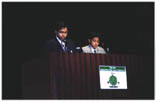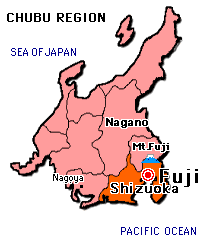Junior Eco-Club Holds Second Asian Conference
 Eighteen children from nine Asian countries and 13 more from Japan described the activities they've been involved in to promote environmental conservation to a gathering of around 700 people at the Second Junior Eco-Club Asia Conference, held in January in the city of Fuji, Shizuoka Prefecture.
Eighteen children from nine Asian countries and 13 more from Japan described the activities they've been involved in to promote environmental conservation to a gathering of around 700 people at the Second Junior Eco-Club Asia Conference, held in January in the city of Fuji, Shizuoka Prefecture.
The two-day meeting was held on January 17 and 18 to promote international exchange among children engaged in ecological activities and to further the cause of environmental protection. It was sponsored by the Environment Agency of Japan and the Shizuoka prefectural government.
The agency launched the Junior Eco-Club (JEC) in June 1995 to encourage elementary and middle school students to become more involved in activities to protect the environment, such as observing animals in their natural habitats and recycling resources. Thousands of kids around the country now take part as members of local JEC chapters. The club held its first Asia conference in November 1996 in Niigata Prefecture.
 The children making presentations at the symposium on January 17 came from China, Malaysia, Nepal, Pakistan, the Philippines, Singapore, South Korea, Sri Lanka, and Thailand, as well as Japan.
The children making presentations at the symposium on January 17 came from China, Malaysia, Nepal, Pakistan, the Philippines, Singapore, South Korea, Sri Lanka, and Thailand, as well as Japan.
Xin Zhou and Yiming Zhou from China talked about an environment program at their school under which they protect nearby wildlife, such as guarding the eggs of wild geese and placing bird houses in the forest.
Participants from Malaysia, Hor-Kee Neoh and Hafizah Ismail, explained the significance of mangrove forests in their country. "A lot of people used to think the forests should be cut down and developed," they said. But attempts to save the forests have made the public more aware of their importance. Mangrove forests prevent coastal erosion, serve as breeding grounds for young fish, and are home to many rare species of animals, the students explained.
 Anjana Prajapati from Nepal talked about eco-club activities at her school, which include recycling waste paper, planting trees, and publishing environmental newsletters.
Anjana Prajapati from Nepal talked about eco-club activities at her school, which include recycling waste paper, planting trees, and publishing environmental newsletters.
Si-Baek Hyun and Uen-Ha Choi, who attend elementary school in South Korea, described the activities of the local environmental group to which they belong, called the Greenscouts. They attend weekly classes to learn ways to save energy and reduce garbage. They also go to a nearby mountain on their bicycles to clean up the litter, they said.
Participants from Sri Lanka insisted on the importance of planting more trees. "Without trees, human being cannot exist. Therefore, to celebrate occasions like birthdays and anniversaries, we advise people to plant trees," said Tharaka Bandara Dissanayake.
 Kotomi Yamaguchi and Marina Yasui from the city of Hamamatsu, Shizuoka Prefecture, in Japan talked about a record they've kept of whether they could see Mt. Fuji or not from their homes. They made observations at 7 o'clock in the morning every day from 1981 through 1997.
Kotomi Yamaguchi and Marina Yasui from the city of Hamamatsu, Shizuoka Prefecture, in Japan talked about a record they've kept of whether they could see Mt. Fuji or not from their homes. They made observations at 7 o'clock in the morning every day from 1981 through 1997.
Five students from the host city of Fuji described their attempt to breed medaka, or Japanese killifish, in a pond they created on their own.
Six members of a Junior Eco-Club in Okazaki, Aichi Prefecture, explained how much waste is produced by fast-food restaurants. They conducted their research by interviewing workers at hamburger shops and sending questionnaires to head offices.
"Hamburgers sold at fast-food stores are the result of thousands of cattle slaughtered every day and forests destroyed to create ranches. Yet the burgers are thrown away if left unsold for just ten minutes after they're cooked. There's something wrong with this," they said.
 Following the symposium, the participating children spent the night at an outdoor camp with around 40 local school kids, playing games and watching the stars. They seemed to have no trouble communicating with one another despite the language barrier, and everybody had a chance to make friends with kids from other countries.
Following the symposium, the participating children spent the night at an outdoor camp with around 40 local school kids, playing games and watching the stars. They seemed to have no trouble communicating with one another despite the language barrier, and everybody had a chance to make friends with kids from other countries.
The following day, they enjoyed ice-skating together before closing out the conference by adopting "Our Resolution in Shizuoka," in which they pledged to take action to preserve their natural surroundings for many generations to come.
Photos: Kids from around Asia gathered to make speeches and friends (Environment Agency and Shizuoka Prefecture).



 Eighteen children from nine Asian countries and 13 more from Japan described the activities they've been involved in to promote environmental conservation to a gathering of around 700 people at the Second Junior Eco-Club Asia Conference, held in January in the city of Fuji, Shizuoka Prefecture.
Eighteen children from nine Asian countries and 13 more from Japan described the activities they've been involved in to promote environmental conservation to a gathering of around 700 people at the Second Junior Eco-Club Asia Conference, held in January in the city of Fuji, Shizuoka Prefecture.
 The children making presentations at the symposium on January 17 came from China, Malaysia, Nepal, Pakistan, the Philippines, Singapore, South Korea, Sri Lanka, and Thailand, as well as Japan.
The children making presentations at the symposium on January 17 came from China, Malaysia, Nepal, Pakistan, the Philippines, Singapore, South Korea, Sri Lanka, and Thailand, as well as Japan.
 Anjana Prajapati from Nepal talked about eco-club activities at her school, which include recycling waste paper, planting trees, and publishing environmental newsletters.
Anjana Prajapati from Nepal talked about eco-club activities at her school, which include recycling waste paper, planting trees, and publishing environmental newsletters.
 Kotomi Yamaguchi and Marina Yasui from the city of Hamamatsu, Shizuoka Prefecture, in Japan talked about a record they've kept of whether they could see Mt. Fuji or not from their homes. They made observations at 7 o'clock in the morning every day from 1981 through 1997.
Kotomi Yamaguchi and Marina Yasui from the city of Hamamatsu, Shizuoka Prefecture, in Japan talked about a record they've kept of whether they could see Mt. Fuji or not from their homes. They made observations at 7 o'clock in the morning every day from 1981 through 1997.
 Following the symposium, the participating children spent the night at an outdoor camp with around 40 local school kids, playing games and watching the stars. They seemed to have no trouble communicating with one another despite the language barrier, and everybody had a chance to make friends with kids from other countries.
Following the symposium, the participating children spent the night at an outdoor camp with around 40 local school kids, playing games and watching the stars. They seemed to have no trouble communicating with one another despite the language barrier, and everybody had a chance to make friends with kids from other countries.
![]()